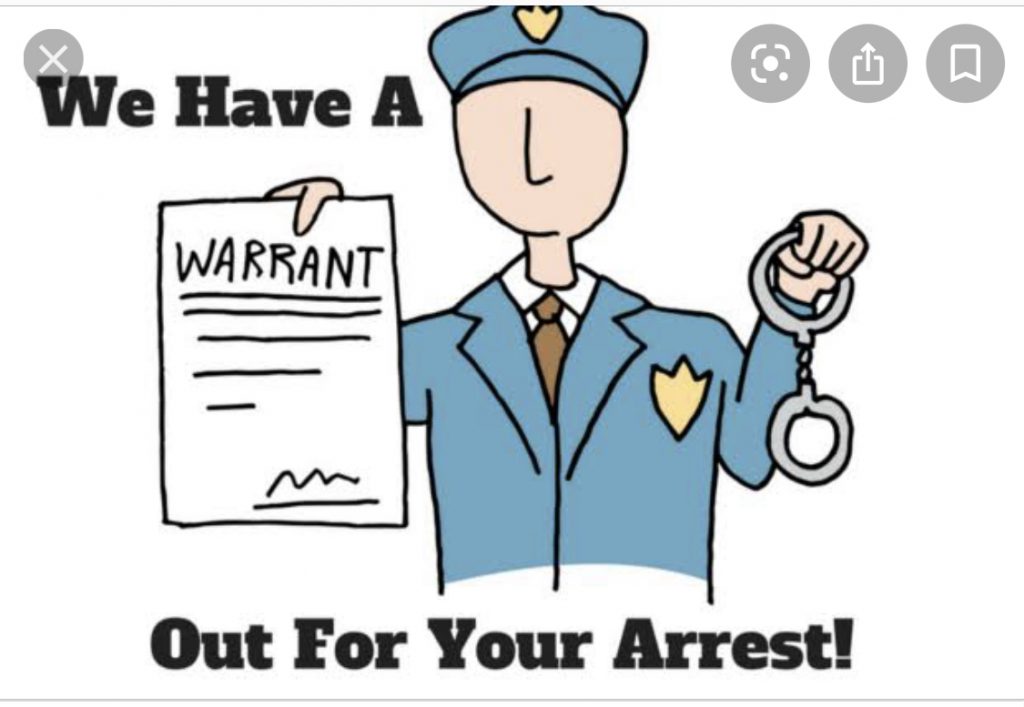Warrant of Arrest: Contents and Issuance. Daily Law Tips (Tip 777) by Onyekachi Umah, Esq., LL.M, ACIArb(UK)
Introduction:
Generally, there cannot be an arrest without a warrant of an arrest, except for some specific crimes and circumstances. A warrant of arrest is a written authority from a court of law, that permits a person to be arrested. Among the fundamental human rights of persons in Nigeria, is the right to personal liberty. With this right, unlike fruits and fowls, no person can be arrested indiscriminately. To protect lives and property, certain security organizations are created by law and empowered to arrest suspected offenders. So, arresting power is a vital tool in the protection of lives and property.
In exercising the power of arrest, there is need for a warrant of arrest except in few circumstances. My earlier work on the few circumstances, titled; “12 Situations Where Police Officers Can Arrest Without Warrant” can be accessed for free via https://sabilaw.org/12-situations-where-police-officers-can-arrest-without-warrant/. So far, the laws have gone further to clearly list out and explain the contents of a warrant of arrest and how to obtain them, thereby making it easy to obtain and detect a valid warrant of arrest.
Warrant of Arrest:
A warrant of arrest is the written permission granted by a court of law, authorizing the arrest of a criminal suspect. It is a document that permits the fundamental human rights of a person (right to liberty) to be restricted in the quest for peace and justice. It can only be issued by a court of law (a Magistrate or a Judge), after hearing the prayers of an arresting agent/complainant, on why a person should be arrested. The statement or complaint in support of such prayer, seeking for a warrant of arrest, must be made on oath by the complaint or a material witness; like an arresting agent. Unlike most of the orders of courts, a warrant of arrest can be issued by a court of law on a Sunday and public holidays.
At this point, it is important to note that a warrant of arrest cannot be issued by an arresting agency. This means that the Nigeria Police Force or its head (the Inspector General of Police) cannot issue a warrant of arrest, because it/he is not a court of law. This applies to all other security agencies in Nigeria. The misconception by a certain national security agency and its agents that their official personal identification cards are warrants of arrest is laudable and condemnable. The said institution and its operatives rely on the inscriptions at the back of its identification card to assume that there are warrants of arrest; this is wrong and unknown to law.
Contents of a Warrant of Arrest:
By the provisions of the Administration of Criminal Justice Act 2015 and other similar laws across states in Nigeria, there are clear contents of a warrant of arrest. First, a warrant of arrest must have the date of the day that the warrant was issued and the signature of the Judge or Magistrate that issued it. It must also contain all necessary particulars, including; suspected offence, name of suspect and the arresting officers directed to make the arrest and bring the arrested person to court. A warrant of arrest may state the name of a particular arresting agent/agency to carry out an arrest and it can also state that all security agents can enforce the arrests.
In urgent cases, where there is no close security agent, a warrant of arrest can be directed to a non-security person (any other person) to enforce. Once a warrant of arrest has been issued, it lives on, until the arrest is made or a court of law vacates (terminates) the warrant of arrest. Once a warrant of arrest has been used to arrest a person or it has been vacated by a court of law, the warrant of arrest is deemed to have expired and as such cannot be used.
Conclusion:
Although, government has the powers to make arrest, government and its agencies must exercise their powers within the circles of law. Nigerian law has listed the conditions for a warrant of arrest to be issued and used, as well as the contents of a valid warrant of arrest. Hence, there should be no arrest without warrant of arrest, except for the circumstances that the law exempts a warrant of arrest. No other person part from a court of law (a Judge or a Magistrate) can issue a valid warrant of arrest and it can be issued on a public holiday and Sunday. No security agency has the powers to draw and issue a warrant of arrest.
My authorities, are:
- Sections 1, 2, 3, 4, 5, 5, 35, 318 and 319 of the Constitution of Federal Republic of Nigeria, 1999.
- Sections 35, 36, 37, 38, 39, 40, 494 and 495 of the Administration of Criminal Justice Act 2015 and its equivalent in states across Nigeria.
- Onyekachi Umah, “12 Situations Where Police Officers Can Arrest Without Warrant” (LearnNigerianLaws.com, 18 June 2019) <https://sabilaw.org/12-situations-where-police-officers-can-arrest-without-warrant/> accessed 19 April 2021
- Onyekachi Umah, “An Ordinary Person Can Arrest A Criminal Suspect Even Without A Warrant In Nigeria” (LearnNigerianLaws.com, 17 July 2018) <https://sabilaw.org/an-ordinary-person-can-arrest-a-criminal-suspect-even-without-a-warrant-in-nigeria/> accessed 19 April 2021
- Onyekachi Umah, “When Can Police Search A House Without A Warrant” (LearnNigerianLaw.com, 11 March 2019) <https://sabilaw.org/when-can-police-search-a-house-without-a-warrant/> accessed 19 April 2021.
- Onyekachi Umah, “The Right Of Police To Break/Damage Any House In Search Of Suspects Even Without Warrant To Search” (LearnNigerianLaws.com, 18 February 2019) <https://sabilaw.org/the-right-of-police-to-break-damage-any-house-in-search-of-suspects-even-without-warrant-to-search/> accessed 19 April 2021
- Onyekachi Umah, “Contents of Police Monthly Reports To Magistrates” (LearnNigerianLaws.com, 17 November 2020) <https://sabilaw.org/contents-of-police-monthly-reports-to-magistrates/> accessed 19 April 2021
- Onyekachi Umah, “Qualifications for an Inspector General of Police” (LearnNigerianLaws.com, 4 February 2021) <https://sabilaw.org/qualifications-for-an-inspector-general-of-police/> accessed 19 April 2021
- Onyekachi Umah, “Can the Appointment of an Inspector General of Police be Extended?” (LearnNigerianLaws.com, 2 February 2021) <https://sabilaw.org/can-the-appointment-of-an-inspector-general-of-police-be-extended/> accessed 19 April 2021.
- Chris Admin, “Onyekachi Umah Speaks To ChannelsTv On SARS & The New Police Act” (LearnNigerianLaws.com, 9 November 2020) <https://sabilaw.org/onyekachi-umah-speaks-to-channelstv-on-sars-the-new-police-act/> accessed 19 April 2021.
- Onyekachi Umah, “Minimum Information That Must Be In Database Of All Arrested Persons At Federal And State Levels In Nigeria” (LearnNigerianLaws.com, 16 September 2019) <https://sabilaw.org/minimum-information-that-must-be-in-database-of-all-arrested-persons-at-federal-and-state-levels-in-nigeria-daily-law-tips-tip-415-by-onyekachi-umah-esq-llm-aciarb-uk > accessed 19 April 2021.
- Onyekachi Umah, “Head of a Police Station Must Make Monthly Report of Arrests to a Magistrate” (LearnNigerianLaws.com, 24 August 2020) <https://sabilaw.org/head-of-police-station-must-make-monthly-report-of-arrests/ > accessed 19 April 2021.
- Onyekachi Umah, “Police Stations Now Have Supervising Magistrates” (LearnNigerianLaws.com, 9 October 2020) <https://sabilaw.org/police-stations-now-have-supervising-magistrates/ > accessed 19 April 2021
- Pic credit: blog.hiya.com
Sabi Law Projects:
#SabiLaw
#DailyLawTips
#SabiBusinessLaw
#SabiElectionLaws
#SabiHumanRights
#SabiLawOnTheBeatFm
#SabiLawLectureSeries
#CriminalJusticeMonday
#SabiLawVideoChallenge
Speak with the writer, ask questions or make inquiries on this topic or any other via onyekachi.umah@gmail.com, info@LearnNigerianLaws.com or +2348037665878 (whatsapp). To receive free Daily Law Tips, join our free WhatsApp group via https://chat.whatsapp.com/L7h4f1exItZ38FeuhXG4WN or Telegram group, via the below link: https://t.me/LearnNigerianLaws
To keep up to date on all free legal awareness projects of Sabi Law Foundation, follow us via
Facebook Page:@LearnNigerianLaws,
Instagram:@LearnNigerianLaws,
Twitter: @LearnNigeriaLaw,
YouTube: Learn Nigerian Laws,
WhatsApp Groups via (https://chat.whatsapp.com/L7h4f1exItZ38FeuhXG4WN),
Telegram Group: (https://t.me/LearnNigerianLaws),
Facebook group: (https://www.facebook.com/groups/129824937650907/?ref=share)
or visit our website: (www.LearnNigerianLaws.com)
Please share this publication for free till it gets to those that need it most. Save a Nigerian today! NOTE: Sharing, modifying or publishing this publication without giving credit to the author or Sabi Law Foundation is a criminal breach of copyright and will be prosecuted. This publication is the writer’s view not a legal advice and does not create any form of relationship. You may reach the writer for more information.
This publication is powered by www.LearnNigerianLaws.com {A Free Law Awareness Program of Sabi Law Foundation, supported by the law firm of Bezaleel Chambers International (BCI).} Sabi Law Foundation is a Not-For-Profit and Non-Governmental Legal Awareness Organization based in Nigeria. For sponsorship and partnership, contact: sponsorship@learnnigerianlaws.com, sabilaw.ng@gmail.com or +234 903 913 1200.

























































7 Responses